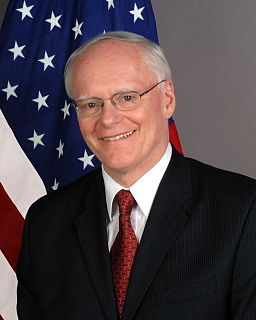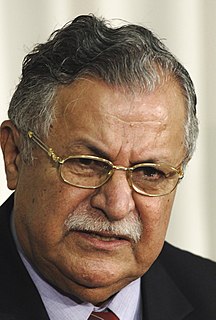A Quote by Patrick Cockburn
Turkey is saying that it wants to preserve Sunni dominance in Mosul. Obviously, there, the Kurds, the Shia, the Iraqi government have their own agendas.
Related Quotes
What we would be committed to would be a representative government where all the Iraqi people decide who should lead their nation, and lead it in a way that keeps it together as a single nation and where all parts of the nation - Shia, Sunni and Kurds - are able to live free and in peace and believe that their interests are represented by the government.
Right, because they're looking at also organizing the Sunni tribes up around Mosul to take back that city as well. That's the second largest city in Iraq. That's going to be a very, very tough fight. And the Shia militias were not used in Ramadi, and we're told by the Iraqi generals that they don't want any Shia militias up in Mosul, either, to take back that city. So - but again, that's going to be a very, very tough fight.
Now the world believes in Kurds, as they have become partners in that region. The West doesn't believe in the Iraqi government - not in Maliki before or Abadi today. It doesn't believe in Syria in any way, nor in Iran. So the Kurds could maybe work together with the Western world to bring stability to the region. It's a nice change, coming as it is after hundreds of years of the struggle of the Kurds.
It is not coincidental that for so-called religious fundamentalists - whether they are Western or Eastern, Muslim or Christian - rigid male dominance and "holy wars" are priorities. Or that competing sects of the same religion, such as Sunni and Shia, are at each other's throats. In these cultures, women are rigidly controlled by men.
It wasn't just Shia that would go to Tehran and see the commander of the Quds Force and others and the legitimate government leaders. It was also Kurdish leaders and Sunni Arabs who would even link up with Qassim Suleimani, the commander of the Quds Force - maybe not in Tehran but in Turkey or somewhere else.
At the end of the day...if your army won't fight, it's because they don't trust their incompetent, corrupt generals, they don't trust each other. This is an enduring civil war between the Shia, the Sunni, and the Kurds. So I don't think we've got any options and we'd be ill-advised to start bombing where we really can't sort out the combatants or understand where the civilian population is.
I think that, given the threat that ISIS poses to the region and beyond, as we have sadly seen in our own country, it is important to keep the Iraqi army on a path where they can actually take back territory, to work with the Sunni tribes in Anbar province and elsewhere so that their fighters can be also deployed, to work with the Kurds to provide them the support, but they're doing the fighting. We're doing the support and enabling.
































